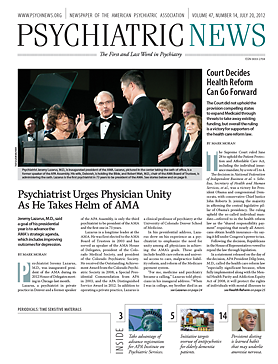The Centers for Medicare and Medicaid Services (CMS) announced May 30 a new initiative to ensure appropriate care and use of antipsychotic medications for nursing-home patients.
The Partnership to Improve Dementia Care, a collaboration among federal and state agencies, nursing homes and other care providers, advocacy groups, and caregivers, has set a national goal of reducing the use of antipsychotic drugs in nursing-home residents by 15 percent by the end of 2012.
“A CMS nursing-home resident report found that almost 40 percent of nursing-home patients with signs of dementia were receiving antipsychotic drugs at some point in 2010, even though there was no diagnosis of psychosis,” said CMS Chief Medical Officer and Director of Clinical Standards and Quality Patrick Conway, M.D., in a press release announcing the effort. “Managing dementia without relying on medication can help improve the quality of life for these residents. The Partnership to Improve Dementia Care will equip residents, caregivers, and providers with the best tools to make the right decision.”
The move is a response to a report last year from the Department of Health and Human Services Office of the Inspector General showing that 14 percent of the nation’s 2.1 million elderly nursing-home residents had at least one Medicare claim for an atypical antipsychotic drug from January 1, 2007, through June 30, 2007. The report was spurred by a request from Sen. Charles Grassley (R-Iowa) to evaluate the extent to which elderly nursing-home residents receive atypical antipsychotic medications and the associated cost to Medicare (Psychiatric News, June 3, 2011).
Earlier this year, CMS solicited comments on how physicians can better ensure that antipsychotic medications are appropriately prescribed to residents of long-term-care (LTC) facilities.
In a letter submitted May 22, APA Medical Director James H. Scully Jr., M.D., outlined APA’s concerns and recommendations regarding the reduction of antipsychotic use in LTC facilities.
“CMS acknowledges in the final rule that some nonpharmacological interventions, like music therapy, massage therapy, and animal-assisted therapy, may be of potential benefit to LTC residents who exhibit behavior symptoms associated with dementia. APA agrees that in some instances nonpharmacological interventions may be sufficient to reduce a patient’s symptoms of dementia,” Scully said in the letter. “However, APA members acknowledge there are myriad instances in which pharmacological interventions are necessary to alleviate a LTC patient’s symptoms. APA members also point out that evidence demonstrating the efficacy of nonpharmacological interventions for LTC patients, particularly those suffering from dementia, is weak.”
Scully also stressed that when antipsychotics are medically indicated for LTC patients, “psychiatrists exercising best practices should prescribe antipsychotics for a limited period of time and then at a later date reevaluate the patients’ use of them.”
CMS said that the steps it is taking to achieve the goal of reduction include enhanced training, increased transparency, and alternatives to antipsychotic medication (see Strategies to Reduce Antipsychotic Use in Nursing Homes).
“We want our loved ones with dementia to receive the best care and the highest quality of life possible,” said CMS Acting Administrator Marilyn Tavenner, R.N. “We are partnering with nursing homes, advocates, and others to improve the quality of care these individuals receive in nursing homes.”
CMS also announced that it would address this challenge in the long run by conducting research to better understand the decision to use or not to use antipsychotic drugs in residents with dementia. The agency said it will conduct a review and analysis of medication prescription practices in 25 nursing facilities in California, Texas, Colorado, Florida, and Pennsylvania. Findings will be used to implement approaches to improve the overall management of residents with dementia, including reducing the use of antipsychotic drugs in this population. Data collection is expected to be completed by mid-August, and the final report should be available by the end of the year.

Strategies to Reduce Antipsychotic Use in Nursing Homes
The Partnership to Improve Dementia Care, a collaboration among federal and state partners, nursing homes, medical professionals, advocacy groups, and caregivers, says it will use the following steps to reduce the use of antipsychotic drugs in elderly nursing-home residents by 15 percent by the end of 2012:
Enhanced training: CMS has developed Hand in Hand, a training series for nursing homes that emphasizes person-centered care, prevention of abuse, and high-quality care for residents. CMS is also providing training focused on behavioral health to state and federal surveyors.
Increased transparency: CMS is making data on each nursing home’s antipsychotic drug use available on its “Nursing Home Compare” Web site (
www.Medicare.gov/NHCompare) starting this month and will update these data.
Alternatives to antipsychotic medication: CMS is emphasizing nonpharmacological alternatives for nursing-home residents, including approaches such as consistent staff assignments, increased exercise or time outdoors, monitoring and managing acute and chronic pain, and planning individualized activities.

